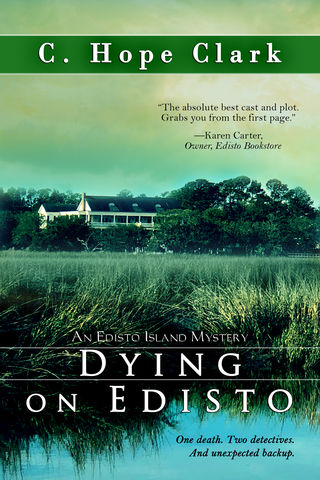Wisdom
How to Pursue Your Creative Passion In Spite of "Life"
A popular author offers 6 tips plus wisdom about writing, publishing.
Posted March 23, 2019

One aspect of reading a good mystery novel is the guaranteed pleasure of knowing that the mystery will be solved. Maneuvering your way through certain periods in real life, however, can wear you out with no real satisfaction.
Novelist C. Hope Clark has lately been going through a challenging time in her own life, as she writes novels, manages a writer’s consulting service, and publishes a newsletter with 35,000 subscribers, all while dealing with two parents who have Alzheimer’s.
Meanwhile, her latest novel, Dying on Edisto, is just out. A stand-alone mystery, it features Callie Morgan and Carolina Slade, the female leads from her two sets of books. Here, she generously takes the time to respond to my questions about her process and how she balances her obligations with her passion for writing.
INTERVIEW WITH C. HOPE CLARK
What came first, your newsletter for writers or your own novel writing?
HOPE: I’ve loved all aspects of writing my entire life. I started with writing poetry (not for long, ugh), then essays (hello, Chicken Soup), then dove into a mystery. Spent two years writing the mystery, even sent the manuscript to Fern Michael’s literary agent since my mother knew her. Quickly rejected. So I threw the manuscript on the shelf, decided I was going to be some kind of full-time writer, and started freelancing.
Four years later, once FundsforWriters was off the ground, I offered to pick up a mystery author at the airport for a local bookstore signing, and we wound up at dinner. She asked me what I wrote, and I told her about the FundsforWriters website and my magazine articles. “No,” she said. “I mean, what do you really want to write? What is your dream?” I told her about the novel. She told me to pull it out and finish it, or I would regret not doing so.
I ran home, dug it off a closet shelf, and excitedly read the first chapter. It totally sucked!!! No wonder it didn’t sell. So I joined a couple of critique groups, tossed the manuscript (but kept a rough outline), and wrote it over.
Were you always a mystery reader/lover before you began this series?
HOPE: I always read mystery, suspense, or adventure. While I’ve read all the other genres, nothing sticks with me like a solid mystery. I want the book to challenge me, raise my pulse, give me something or someone to root for. Most of all, I like the test of an author writing a mystery he dares the reader to figure out.

Can you talk a little about the geographical aspect of your Edisto (and Slade) books?
HOPE: I’m a South Carolina girl. I love the state. In my pre-author life, I was an administrative director for the US Department of Agriculture, covering all of South Carolina. Carolina Slade handles work much as I did with Ag, to include internal investigations. When cases start taking on a criminal smell, crossing the line, Slade calls in a real federal agent, just like I did. Only in my case, I married one of the agents. Slade, like me, has a soft spot when it comes to Senior Special Agent Wayne Largo.
Three books into the Slade series, my publisher asked me to consider a second series, giving me three parameters: set the series in one setting in SC, make the protagonist a female in law enforcement, and insert gobs of Southern family drama. My favorite spot in South Carolina is Edisto Beach, and I’d spent many dates there. So the Edisto series was born. Edisto Island is a sea island, which comes with its own jungle atmosphere. An hour away from Charleston on a two-lane road, Edisto Beach is an end-of-the-world place.
Your writing style is conversational. Do you read your words aloud at some point when revising?
HOPE: I adore dialogue, with a passion! I watch for snappy, soothing, entertaining dialogue in every book I read. And yes, I read aloud a lot! When I write a chapter, I then read it aloud. When I finish a book, I read the entire thing aloud to my husband on the back porch, equipped with tea (or bourbon), chapstick, and eye drops, because the full book is quite the ordeal. But there is no other way to hear whether the writing flows and the dialogue is realistic.
Do you revise much?
HOPE: Yes, I revise a lot. However, with each book, I’ve become a better, faster writer. I am comfortable with my voice now that I’m working on my tenth novel.
Do you have further titles/series in mind?
HOPE: I’m writing the 6th Edisto book now and have a contract for it and another Slade book (the 5th in that series). Plus, I’m starting a third series that might be self-published. It’s too early to tell. My contract obligations come first. But I’ll write my stories until I’m unable to write. I’m lucky to be working at something I hope to never retire from.
How do you manage all the details of a complicated plot? Bulletin board, cards, software? Perhaps an outline?
HOPE: I wish I had a tried-and-true system, but I wing a lot of what I write. I love untangling a mystery just as the protagonist does. . . maybe only one step ahead. The major series characters are developed, although I do have to attempt to grow the protagonist as times goes on, like in any good story.
The setting for the Edisto Mysteries is Edisto. I have to pick a new part of the state for Slade. Then comes the crime. Then the opening chapter so that there is a good jumping off point. From there I outline three chapters at a time in longhand. Then before details get away from me, I jot notes on a huge dry erase board on the wall of my study.
I do not care to know way ahead of time how the plot goes. It takes the fun out of the journey. And yes, I have had to delete whole chapters, remove or add a character, and swap events around. Sometimes at the request of an editor and other times when I wrote myself into a corner, but writing and following an entire outline bores me to tears.
I keep a notebook for each book, with no rhyme or reason to the scribbles, but to capture my thoughts as I’m brainstorming. That’s it. I have a spreadsheet bible to keep track of all the names, descriptions, vehicles they drive, beach house names, etc. because over time you do forget them! Oh, and I usually throw away the notes once the book is published.
How have you been able to stay focused on creative work while caring for oldsters with failing mental faculties?
HOPE: Both my parents have Alzheimer’s. I had to jump through a lot of legal hoops to become their guardian so that decisions could be made as to their estate and their health. Add to that one parent being eight weeks in the hospital at death’s door last year.
Making myself write wherever I was helped me weather the disasters. I’ve written on the floor at the end of hospital hallways, propped on a hospital bed, on a sidewalk curb, in a waiting room, in the car, in rehab, in a nursing home. Talking story, instead of rehashing looping daily events that were mostly out of my control, absolutely kept me sane. My Edisto and Slade worlds are safe for me. I can go there and feel so like myself. With that in mind and a looming deadline, I wrote daily. It might not be more than a hundred words, but I wrote.
SIX STRATEGIES TO MAKE YOUR WRITING STRONGER, provided by Hope:
1) Write daily (or at least on a full-time schedule, meaning 5-6 days a week). Every highly successful author does. To be treated like a professional means showing up to work daily. Writing daily keeps the wheels lubricated, and even if it’s only 1-2 hours each day, you’ll advance quicker which will make you more excited about what you do.
2) Write in silence. The deeper the silence, the deeper the thought. Many people are not comfortable in their own silence, but that’s where you find the magic ideas and how to word them.
3) Edit aloud. Read each chapter aloud after it’s written. Read the entire book all the way through at the end. If you cannot read it, get someone to read it to you so that you’re listening to the flow, voice, and dialogue.
4) Don’t talk to others about what you haven’t written. It kills the energy of the project.
5) Read heavily in the genre you’re writing and take notes. Note the items that catch your attention. When I’m reading strong authors, I keep a notebook beside me. Just a simple turn of phrase can make me look at one of my scenes with a different eye. No, you won’t accidentally plagiarize. Nobody accidentally plagiarizes. That’s bunk.
6) Critique other writing when asked. Nothing makes you stronger than having to teach a subject, and critiquing someone else’s work makes you study details. Whether you critique in a group online or join a local group, be willing to dive in and critique hard. . . and be willing to be critiqued hard. That process teaches you so much and toughens your skin in preparation for those rejections and inevitable one-star reviews.
BIO: Award-winning author C. Hope Clark’s latest release is Dying on Edisto, Book 5 of the Edisto Island Mysteries. She founded FundsforWriters.com, selected by Writer’s Digest for its 101 Best Websites for Writers for 18 years. Her newsletter reaches 35,000 readers.
(c) Copyright 2019 by Susan K. Perry




